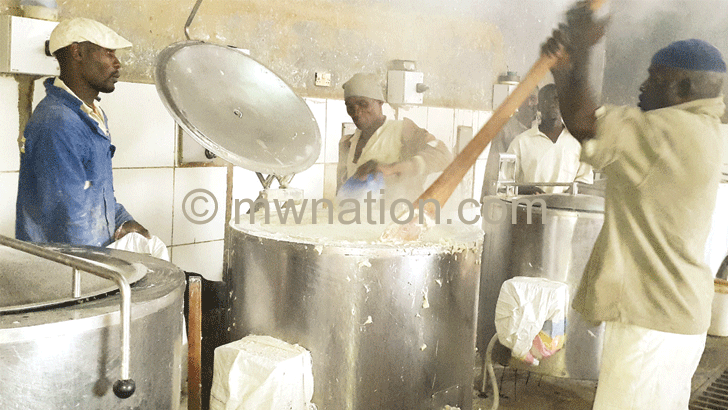Right to food suffers in jail
When it comes to the right to food in the country’s overcrowded prisons, most Malawians, especially decision makers, do not seem to care what the inmates eat and how often.
This indifference to agony of nearly 14 000 Malawians, served one meal per day, could be a relic of the repressive rule of founding president Hastings Kamuzu Banda and his special intelligence aide Focus Martin Gwede who turned Mikuyu Prison into a dumpsite for perceived dissidents.

plenty in this file photo
To them, prisons are no hotels and the inmates have no claim to five-star treatment, three-course meals and sanitary surroundings.
However, the people that are either awaiting trial or serving sentences have the right to food.
We arrive at Mwanza Prison around 11am. The gates are closed. Nearby, a sombre crowd is waiting to deliver foodstuffs to their jailed friends and relatives.
The scene exposes the inmates’ neglected demand for sufficient and nutritious food.
“Both the quality and quantity of the food the prisoners get leave a lot to be desired,” says James Mbano, one of the concerned visitors.
To him, everything happening behind the high walls is part of the punishment.
In there, “food” means a plateful of porridge-like nsima with either beans or pigeon peas. The relish is monotonous, undercooked and heavily weeviled, but that is almost all the confined population eats.
Hebert Kambanje and his fellow inmates no longer eat three meals a day.
“Now, we eat once and the rations are neither tasty nor enough,” he says.
Wearing a white uniform, the barefooted inmate appears emaciated, pale, weak and malnourished as he walks from one row to another in a tomato field with a knapsack sprayer strapped on the back.
“I don’t know when I will eat,” he said, asking for “K50 for a bite”.
At Chichiri Prison in Blantyre the same day, the convicts and remandees had not yet received their meal by 4pm.
The country’s prisons accommodate twice the recommended number of occupants.
The detested diet worsens the hardship and disease burden of the crowds in stinking cells marked with massive congestion, poor ventilation and no toilets.
Boxten Kudziwe, a civil liberties’ defender at Centre for Human Rights Education, Advice and Assistance (Chreaa), served 11-year imprisonment at Chichiri.
One substandard meal per day can be a “heinous punishment on its own”, he says.
However, the problem worsens when friends and relatives are far away or tired of bringing food.
“My wife used to bring food, but only did it for three year,” says the 30 year-old.
Undernourishment is a health catastrophe. Recently, Doctors without Borders screened 357 inmates at Mulanje Prison and found 50 of them “severely malnourished”.
Their deputy head of mission Nicolette Jackson put this in context: “If 14 percent of adults have severe, acute malnutrition in a particular community, it is defined as an acute food crisis.”
Having worked at Chichiri and Maula since 2014, the medics are increasingly concerned by the inadequate food and medical care prisoners are receiving.
“Although the Mulanje case cannot be generalised to all of the country’s 28 prisons, it is clear that the prison service is unable to meet even the minimum nutritional requirements for the 14 000 inmates under its care,” Jackson writes.
Malawi Prison Service (MPS) public relations officer Smart Maliro has not responded to our enquiry on why the correctional agency still gives inmates a diet typical of the dictatorial era.
However, the International Convention on Civil and Political Rights entitles all persons deprived of their liberty to be treated with dignity.
Chreaa executive director Victor Mhango says there is no excuse for this human rights violation.
“Food is not part of the punishment,” he says.
The human rights organisations recently petitioned President Peter Mutharika to release convicts with minor offences to ease congestion and food demand.
Mutharika has since ordered the Treasury to prioritise funding for prison reforms to ease food crisis, but the activist’s excitement is measured.
“A committee has been formed to look into the issues. We are just watching. It is time we reformed our prisons for the better,” Mhango says.





